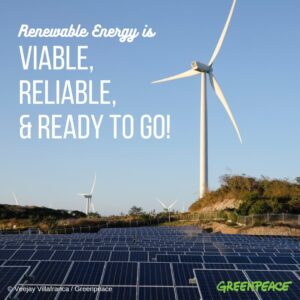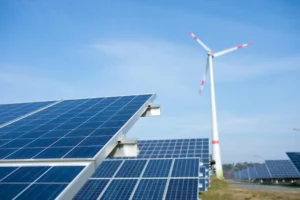Greenpeace activists raise wind turbine at Ukraine conference in call for green reconstruction, Lugano, Switzerland – Activists from Greenpeace raised a reproduction wind turbine, near the setting of the Ukraine Recovery Conference today in Lugano, in a call for recuperation efforts to be founded on sustainable energy frameworks, not atomic or petroleum derivatives. As benefactors meet to examine reconstruction after the Russian invasion, Greenpeace along with Ecoaction and in excess of 45 Ukrainian common society organizations is calling for a green reconstruction plan.

Ukrainian non-legislative organizations have created guiding principles to guarantee that Ukraine’s green post-war reconstruction conveys sustainable financial turn of events and is advantageous to individuals and nature.[1]
Natalia Gozak, chief overseer of Ecoaction, situated in Kyiv, said: “It is presence of mind that Ukraine shouldn’t revamp its infrastructure to the old Soviet principles. As a potential EU candidate country our drawn out objective should accomplish climate nonpartisanship by 2050. This implies a green and sustainable post-war reconstruction that adjusts monetary, social and ecological wellbeing. We should reconstruct our urban communities with the most noteworthy energy productivity norms and in a climate-shrewd way. We can’t be reliant anything else on non-renewable energy sources. We really want to reestablish harmed environments and lift clean industry. Many years of difficult work are ahead and we can’t afford to design it wrong all along.”
The European Center for Economic Policy Research estimates the ebb and flow cost of reconstruction in Ukraine to be around USD 500 billion and 1000 billion, rising as the conflict continues.[2] This sum includes investments, awards, information and innovation move, limit building, HR, coordination and planning as well as straightforward contributor country coordination.[3]
The conflict in vigorously industrialized pieces of Ukraine has increased natural dangers. Europe’s biggest thermal energy station Could a higher protein intake lead, Zaporizhzhia, remains under Russian occupation and the security of its operation under threat. Enormous land regions might be contaminated with unsafe synthetic substances. Different dangers include water contamination, natural habitat obliteration and greenhouse gas discharges, impacting individuals’ wellbeing and food supply as well as climate and biodiversity in Ukraine and then some.

Denitza Petrova, campaigner with Greenpeace Central and Eastern Europe who was important for the activity today said: “The horrible obliteration of Ukraine’s infrastructure, economy and society by the Russian military should stop. In supporting the rebuilding of Ukraine, the European Union and international local area should guarantee the most elevated principles of sustainability are at the center of reconstruction efforts. Full participation of common society is fundamental for an impartial and versatile recuperation of Ukraine and insurance of the climate. It’s essential that international givers invest their cash in green and sustainable recuperation, not atomic and petroleum derivatives.”
As significant urban areas obliterated by Russia (like Chernihiv, Mariupol, Kharkiv) are remade, reconstruction should zero in on using sustainable advancements, for example, sun based power, zero-energy buildings and metropolitan planning that puts individuals and nature at the middle, say campaigners. Notwithstanding the natural advantages, sustainable energy supply additionally advances energy independence.
Iris Menn, leader head of Greenpeace Switzerland, said: “Switzerland and all states involved should uphold an environmental, sustainable and socially fair reconstruction of Ukraine at each open door. This starts today in Lugano.”
